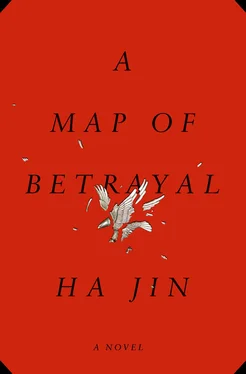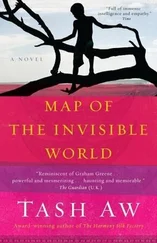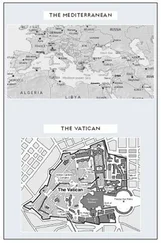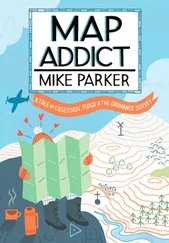Like his friend George Thomas, Gary had bought a little red book at the campus bookstore on his visit to Georgetown University. He read it from cover to cover but was underwhelmed. He found Mao’s thoughts rather crude and incoherent, though they were pithy and earthy, showing some solid horse sense. Most of them were incendiary ideas, more suitable for inciting and organizing the masses than for solving the nation’s problems. No wonder so many hot-blooded college students in America also worshiped Mao, carrying the little book like the Chinese Red Guards. Some even wore Mao buttons. Gary couldn’t help wondering where they’d gotten them. He and George Thomas talked about Mao’s quotations one evening at Bohemian Alley, both of them in shirtsleeves with their jackets draped inside out over the backs of their chairs. After releasing a belch, Thomas chuckled and said, “If I were thirty years younger, I might take the little red book as my bible too. It can misguide youngsters easily.” Thomas was in his mid-fifties now, his hair sparse and half gray, but his eyes were still vivid and bright.
“Mao’s brain seems wired differently,” Gary said, pouring more beer into his glass. “He still has a young warrior’s mentality, aggressive and ruthless.”
“I have to say he has lots of gumption and charisma.” Thomas spoke in a flat voice. “Mao is fearless and shrewd. Still, sometimes I was befuddled as I was reading him. How the hell could he say ‘There is endless joy in fighting heaven, there is endless joy in fighting earth, and there is endless joy in fighting man,’ as if he were a god of warfare? It’s beyond me.”
“He’s being celebrated as a deity there,” Gary said. “A septuagenarian war god, my ass. For me, Mao is China’s biggest problem.”
“Why’s that?”
“His ego is so enormous that he can never swallow his pride in the interests of his country and his people. He sees China not as his responsibility but as his property. He doesn’t understand that even though he’s the head of the nation, he’s still no more than its manager, its servant.”
“Can you be more specific about his mistakes or shortcomings?”
“For example, he should have tried every way to retain the Soviets’ aid for China, but he fell out with Khrushchev because he couldn’t eat humble pie. He couldn’t see how poor and underdeveloped China was, and couldn’t sacrifice his personal pride so that the Chinese people could benefit more from the Soviets’ economic help. In retrospect, I would attribute most of China’s recent disasters to Mao’s egotism. He has styled himself as a thinker and is never practical. He’s too romantic to be a sophisticated and responsible leader. Worse yet, he has never kept his hands on small things, different from Stalin, who would oversee minute details in his economic plans. Even for a thinker, Mao’s ideas are quite sloppy, and most of them are derivative.” Gary caught himself and stopped short. Never had he spoken about the supreme leader like this. His loosened tongue disturbed him.
Thomas said, “I can see the difference between Mao and Stalin. Mao sometimes acts like a juvenile, lacking consistency and integrity. But you can also say he’s more like a poet.” Thomas ripped a packet of Sweet’N Low and emptied the powder into his iced tea.
“His poetry is okay,” Gary said. He wondered why Thomas was so fond of the sugar substitute. He wouldn’t touch the sweetener, because Nellie would not allow him, saying it contained too much saccharin.
A soaring saxophone note drew their eyes to the band. A trio of musicians was playing jazz, all swaying their bodies and tapping their feet. The music then went slow, dangling with a tumbling melody. Gary narrowed his eyes, and his facial expression became dreamy.
IT WAS AT THE END OF 1966 when he began to dye his graying hair. His wife thought he was too vain and told him that he actually looked better with salt-and-pepper hair, more respectable and even a bit professorial, but he wouldn’t let his hair be ravaged by the hands of his biological clock. He joked by imitating Mao, “There is endless joy in fighting nature.” He laughed at his own quip, which baffled Nellie. Once she grunted behind his back, “Crazy boob.” Their daughter overheard her, but she too wanted to see her father look younger and more vigorous. She had once run into Gary and Suzie together in his car and found the small woman pretty with an angular face, clear skin, and delicate shoulders. At the sight of Lilian, they stopped talking. Gary waved at his daughter as if inviting her to get into the car, but the girl spun around and sprinted away, the hem of her plaid skirt fluttering. She never told her mother about the encounter. Somehow she couldn’t hate Suzie, perhaps because she could tell that her dad appeared younger and more spirited when he was with her.
With his espionage activities suspended, Gary could relax some. He no longer needed to fuss over the secrecy that had almost become second nature, although he still wouldn’t let Nellie enter his study. There was a plethora of useful intelligence going through his hands nowadays, but he didn’t bother to collect most of it. What was the good of gathering the information if it couldn’t be delivered? So he just let it slip by and picked only the items that might have long-term value.
These years, from 1966 to 1968, with his mission in the doldrums, were the most peaceful period of his life in America. He enjoyed the solitude and had acquired a taste for various kinds of cheese and California wines. He often walked in the parks alone for hours on end, carrying a twisted cane to keep away wild animals, especially snakes. His family life was uneventful despite Nellie’s knowledge of Suzie. His wife realized that psychologically he might need a woman from his native land. As long as Suzie didn’t pose a threat to their marriage, Nellie wasn’t going to make a big fuss about the affair. Many years later, when her daughter asked her why she had turned a blind eye to her father’s keeping a mistress, Nellie said, “Maybe that floozy could give him something I couldn’t. I felt sorry for your dad. He was such a lonesome soul that he might’ve needed to find some comfort elsewhere. In spite of everything, I loved him.”
Early in the winter of 1968, Gary came across a report sent over by Taipei, which stated that the Soviets had recently deployed more than thirty mechanized divisions in Mongolia besides those already in Siberia, perhaps with the intention to attack China. It was known that the two countries had border disputes, but never had Gary expected that their small-unit skirmishes would escalate into a confrontation of such a scale. He had no doubt about the validity of the information. Taiwan’s intelligence service had a monitoring station in Mongolia, designed to follow the military activities inside China, but on the sly the listening post also kept an ear on the Soviet army’s movements. And Taipei would routinely pass the information to the Americans. Gary was uncertain if China knew about all the Russian divisions and missile brigades placed along its northern border. He grew restless, being unable to send out the intelligence.
Then, in March 1969, military clashes broke out between the Soviets and the Chinese on the Wusuli River. In the two small battles, the Chinese troops got the upper hand even though they were not as well equipped and didn’t use tanks. They’d been better prepared and ambushed the Russian soldiers who went in armored vehicles onto Zhenbao Island in the frozen river. The border fights galvanized the world. In China large public demonstrations against the Soviet chauvinists took place in many cities, while in the United States politicians and experts appeared on the radio, a few on TV, speculating about whether the two Communist countries might go to war. Most people in the West were glad to see the widening gulf between the two Red powers. For weeks Gary had been thinking about the possibility of a war, tormented by it. Everything inside China seemed a mystery now. The country was surely in disarray, yet it had been quite aggressive in confronting the superior Soviet army. Why would Mao authorize such a move? Didn’t he understand that the Soviets might invade China just as they had occupied Czechoslovakia the previous summer? Was China ready for a war that might cripple, if not destroy, a good part of the country? Didn’t Mao dread the Russians’ thousands of nuclear warheads?
Читать дальше











